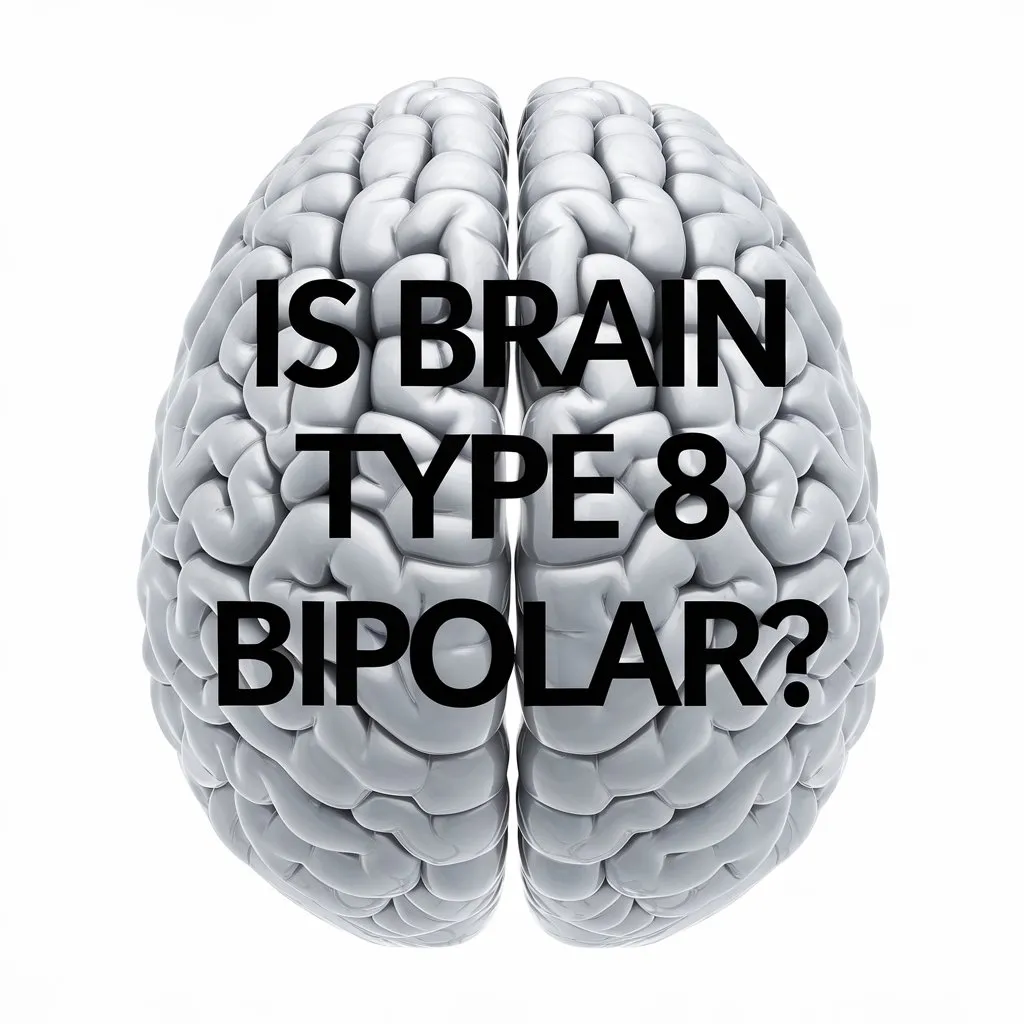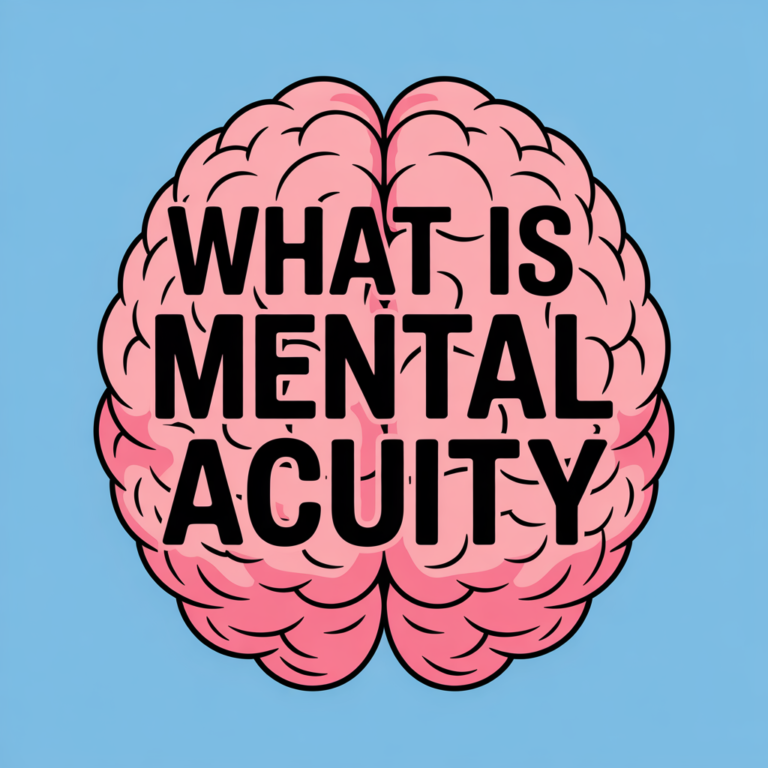The concept of “brain types” has become increasingly popular in the fields of psychology and neuroscience. It offers a fresh perspective on how our cognitive processes, behaviors, and emotional responses are influence by the structure and functioning of our brain. When it comes to understanding mental health conditions like bipolar disorder, examining brain types can provide valuable insights. But is brain type 8 bipolar, and if so, what does that mean for individuals living with this brain type?
In this article, we’ll explore the relationship between brain type 8 and bipolar disorder. We’ll dive into the characteristics of brain type 8, the symptoms and nature of bipolar disorder, and how these two concepts intersect. By the end, you’ll have a comprehensive understanding of whether brain type 8 is associate with bipolar disorder and what this could mean for treatment and management.
Understanding Brain Type 8
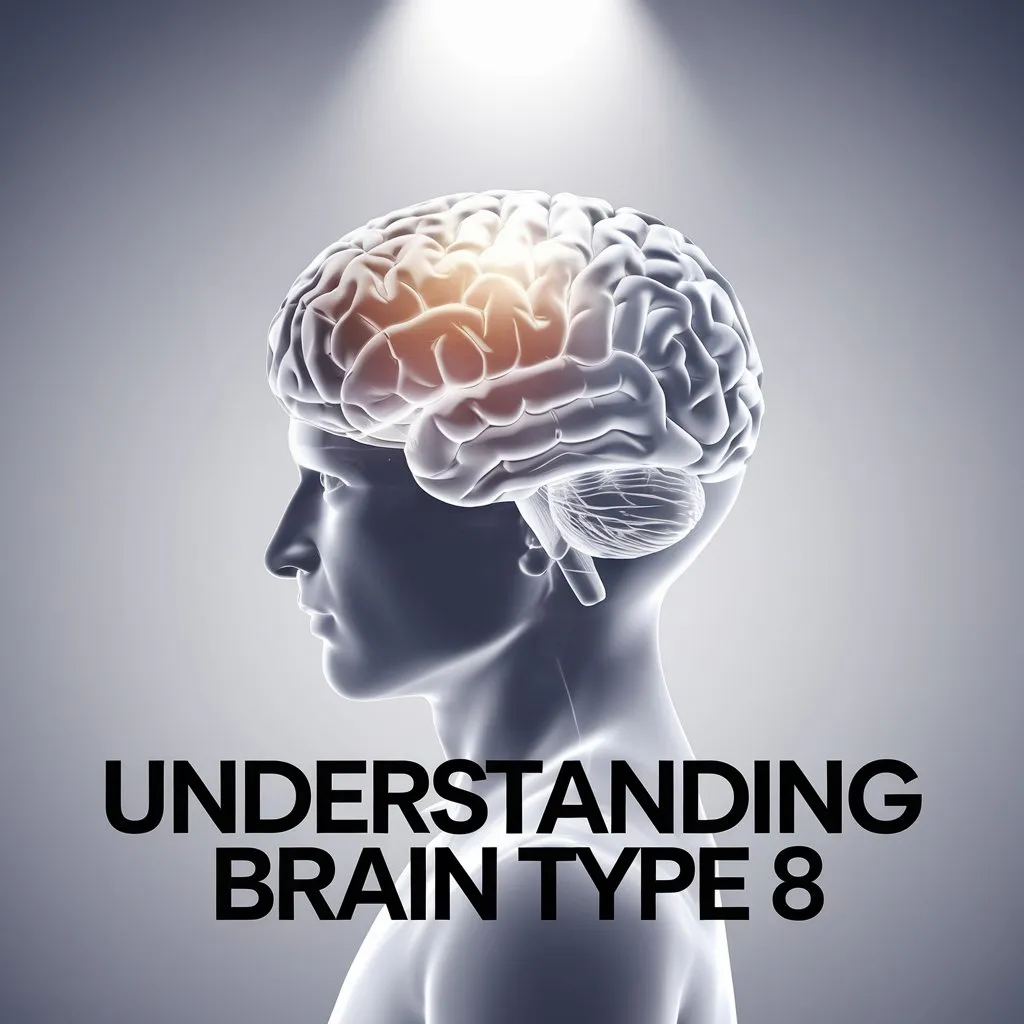
What Are Brain Types?
Before we delve into brain type 8 specifically, it’s essential to understand what brain types are. The idea of brain types is based on the notion that each individual’s brain functions differently, influenced by genetics, environment, and other factors. Brain types attempt to categorize these differences into distinct groups that reflect unique cognitive and behavioral traits.
This concept was popularized by neuroscientists and psychologists who aimed to provide a framework for understanding individual differences. Brain types are often linked to a person’s decision-making processes, emotional stability, and overall personality traits.
Characteristics of Brain Type 8
Brain type 8 is generally described as the “sensitive and vigilant” type. Individuals with brain type 8 tend to be hyper-aware of their surroundings, often reacting intensely to emotional stimuli. They are typically cautious and detail-oriented, with a strong sense of responsibility. While these traits can be beneficial in certain scenarios, they can also lead to increased stress, anxiety, and difficulty managing emotions.
Other key characteristics of brain type 8 include:
- High Sensitivity: Individuals may be highly sensitive to physical and emotional stimuli, leading to intense emotional responses.
- Hyper-vigilance: A heightened state of awareness and alertness, sometimes resulting in anxiety or stress.
- Perfectionism: A tendency towards perfectionism and a strong need for control.
- Emotional Intensity: People with brain type 8 often experience intense emotions and mood fluctuations, making it challenging to maintain emotional balance.
Is Brain Type 8 Bipolar? Exploring the Link
What Is Bipolar Disorder?
Bipolar disorder is a mental health condition characterized by extreme mood swings that include emotional highs (mania or hypomania) and lows (depression). These mood shifts can vary in frequency, intensity, and duration, significantly impacting an individual’s quality of life. It is classified into several types, such as Bipolar I Disorder, Bipolar II Disorder, and Cyclothymic Disorder, each with distinct patterns of mood episodes.
Symptoms of Bipolar Disorder
To understand if brain type 8 and bipolar disorder are connected, it’s crucial to recognize the primary symptoms of bipolar disorder:
- Manic Episodes: These are periods of elevated mood, increased energy, and hyperactivity. Individuals may feel euphoric, excessively confident, or irritable. They may also engage in risky behaviors or make impulsive decisions.
- Depressive Episodes: In contrast, depressive episodes are marked by intense feelings of sadness, hopelessness, and low energy. People might experience difficulties in sleeping, eating, and concentrating during these phases.
- Mood Swings: The hallmark of bipolar disorder is the oscillation between these manic and depressive states, which can occur over days, weeks, or months.
The Overlap Between Brain Type 8 and Bipolar Disorder
Now that we’ve outlined the characteristics of brain type 8 and the symptoms of bipolar disorder, it’s time to examine the potential overlap. Is brain type 8 bipolar, or are they two distinct phenomena that occasionally intersect?
- Emotional Intensity and Mood Swings: One of the primary similarities between brain type 8 and bipolar disorder is emotional intensity. Individuals with brain type 8 often experience heightened emotions, similar to the mood swings observed in bipolar disorder. However, the difference lies in the duration and severity of these emotional shifts. In bipolar disorder, mood changes are more prolonged and severe, whereas brain type 8 individuals might experience shorter but intense emotional responses.
- Hyper-vigilance and Anxiety: People with brain type 8 often exhibit hyper-vigilance, leading to anxiety and stress. While anxiety is not a direct symptom of bipolar disorder, it frequently coexists with it. The hyper-vigilance seen in brain type 8 might contribute to or exacerbate the symptoms of anxiety that are often present in individuals with bipolar disorder.
- Perfectionism and Control Issues: Both brain type 8 individuals and those with bipolar disorder may struggle with perfectionism and a need for control. During manic episodes, people with bipolar disorder might exhibit impulsive perfectionism, taking on too many projects or responsibilities. Similarly, brain type 8 individuals, with their tendency toward vigilance, may experience similar struggles when their emotional state becomes overwhelming.
Key Differences Between Brain Type 8 and Bipolar Disorder
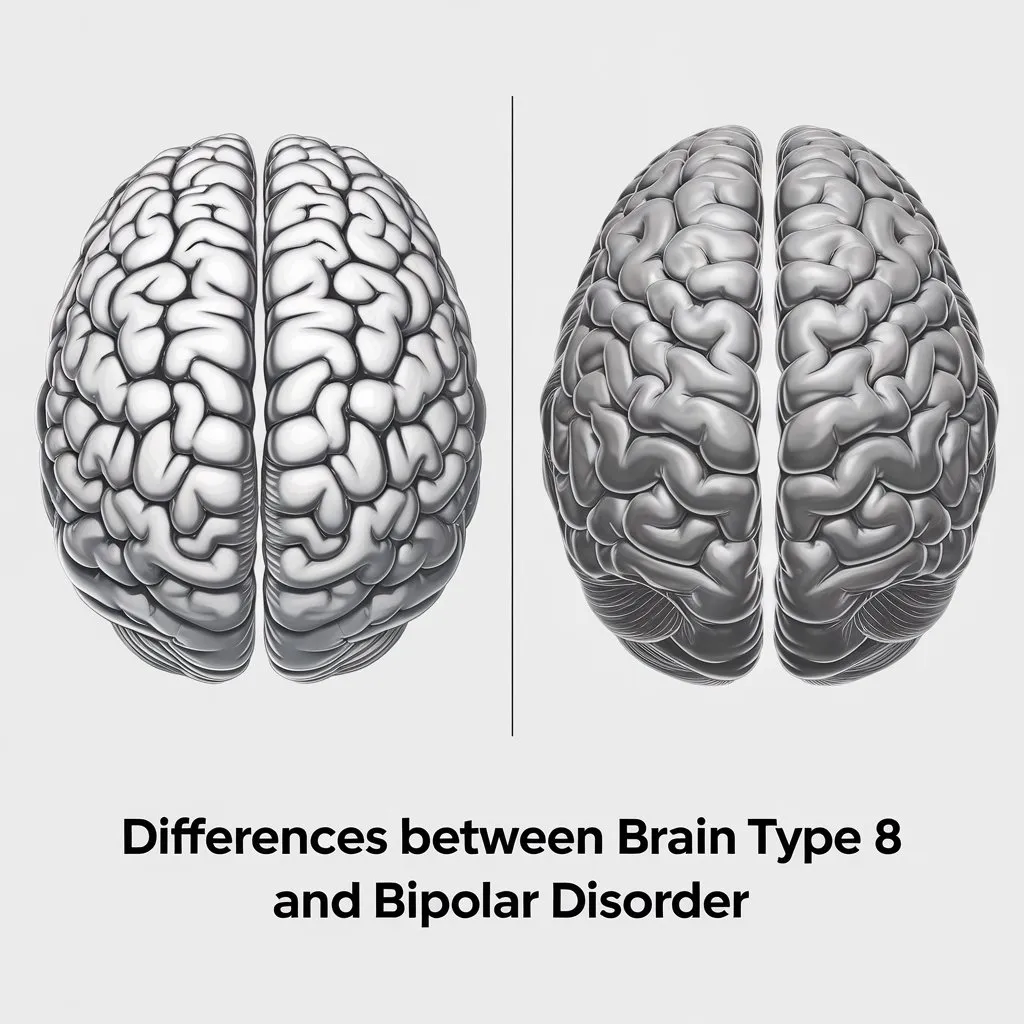
While there are notable overlaps between brain type 8 and bipolar disorder, several key differences highlight why they are not synonymous:
- Severity and Duration: Bipolar disorder involves prolonged periods of mood elevation or depression that significantly impair daily functioning. Brain type 8 individuals may have emotional fluctuations, but these are typically less extreme and shorter in duration.
- Mania and Hypomania: Brain type 8 does not include manic or hypomanic episodes, which are hallmark features of bipolar disorder. The mood shifts experienced by those with brain type 8 are often reactions to stress or environmental triggers rather than inherent mood cycles.
- Diagnosis and Treatment: Bipolar disorder is a diagnosable mental health condition that often requires medical treatment, such as mood stabilizers, therapy, or lifestyle interventions. In contrast, brain type 8 is not a diagnosable disorder but rather a cognitive and emotional profile that may require different strategies, such as stress management techniques and emotional regulation exercises.
Causes and Risk Factors: Why Some Brain Types May Be More Vulnerable
Genetic and Environmental Influences
The development of bipolar disorder is complex, involving both genetic and environmental factors. Research indicates that people with certain brain types, like brain type 8, may have an increased sensitivity to these risk factors, making them more vulnerable to developing bipolar disorder under the right circumstances. Genetic predispositions, early-life stress, trauma, or substance abuse can increase the risk of bipolar disorder in individuals with a sensitive brain type.
Neurological Underpinnings
Brain type 8 individuals often have heightened activity in the limbic system, which regulates emotions, and the prefrontal cortex, responsible for decision-making and impulse control. An imbalance in these areas may increase the likelihood of experiencing intense emotions, similar to those seen in bipolar disorder. However, it is important to note that having brain type 8 does not necessarily mean one will develop bipolar disorder; it simply suggests a potential predisposition to emotional dysregulation.
Managing Brain Type 8 and Bipolar Disorder
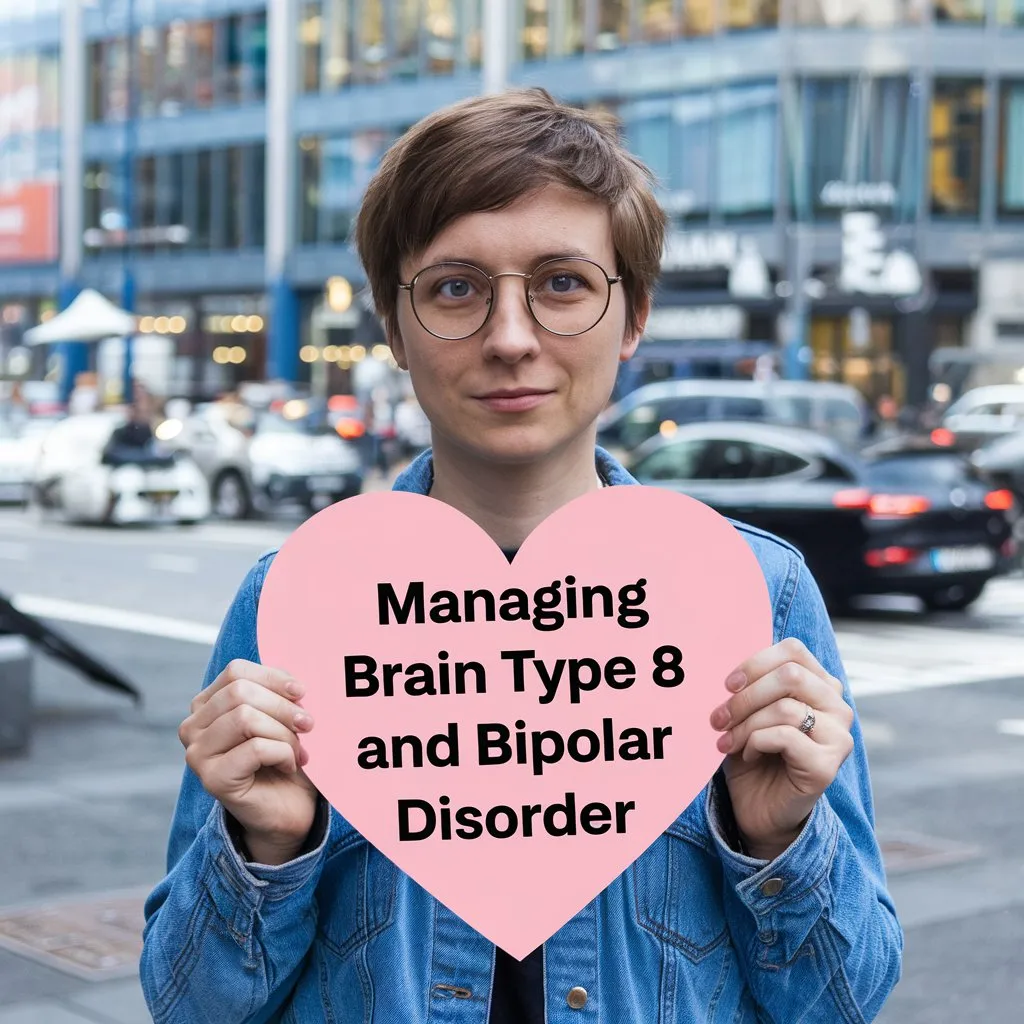
Coping Strategies for Brain Type 8
For individuals with brain type 8 who experience intense emotions but do not meet the criteria for bipolar disorder, coping strategies focus on emotional regulation, stress management, and maintaining a healthy lifestyle. Some effective strategies include:
- Mindfulness and Meditation: Practicing mindfulness can help individuals with brain type 8 stay present and reduce the intensity of emotional reactions.
- Cognitive Behavioral Therapy (CBT): CBT is an effective tool for managing emotional sensitivity and hyper-vigilance by challenging negative thought patterns and developing healthier coping mechanisms.
- Routine and Structure: Maintaining a consistent daily routine can provide stability and reduce stress, which is particularly beneficial for individuals who thrive on control and order.
Treatment Approaches for Bipolar Disorder
If an individual with brain type 8 is diagnose with bipolar disorder, treatment will typically involve a combination of medication, therapy, and lifestyle changes. Common treatments include:
- Medication: Mood stabilizers, antipsychotic medications, and antidepressants are often used to manage the symptoms of bipolar disorder.
- Psychotherapy: Therapy, such as CBT or dialectical behavior therapy (DBT), can be beneficial in helping individuals manage mood swings and develop healthy coping strategies.
- Lifestyle Adjustments: Regular exercise, a balanced diet, and a stable sleep schedule are essential for managing the symptoms of bipolar disorder.
Conclusion: Is Brain Type 8 Bipolar?
The question “Is brain type 8 bipolar?” does not have a straightforward answer. While there are overlaps in emotional intensity and sensitivity, brain type 8 is not inherently bipolar. Instead, individuals with brain type 8 may have a predisposition to emotional dysregulation, which could increase the risk of developing bipolar disorder under certain conditions. It’s essential for people with this brain type to understand their emotional patterns and seek appropriate strategies to manage their emotions effectively.
In summary, while brain type 8 and bipolar disorder share some common characteristics, they remain distinct. Recognizing the differences and understanding the specific needs of each can lead to better management and overall mental health outcomes. For those with brain type 8, learning coping mechanisms and seeking professional help when needed can be key to maintaining a balanced and fulfilling life.

